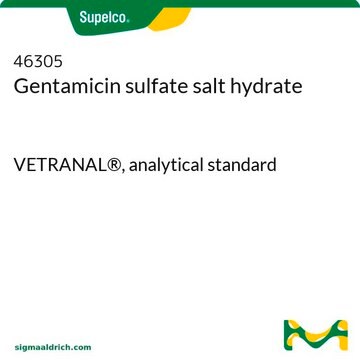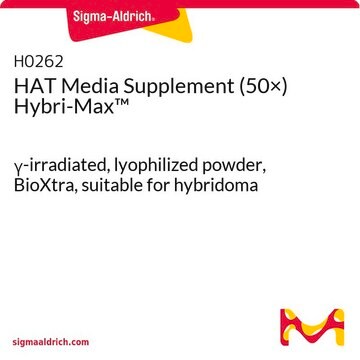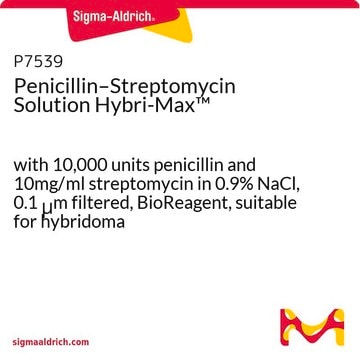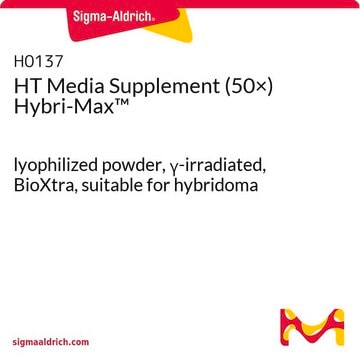G1522
Gentamicin
solution, suitable for hybridoma, BioReagent
Synonym(s):
Garamycin, Gentiomycin C
About This Item
Recommended Products
product name
Gentamicin solution, Hybri-Max™, 50 mg/mL gentamicin, 0.1 μm filtered, BioReagent, suitable for hybridoma
grade
Hybri-Max™
Quality Level
sterility
0.1 μm filtered
product line
BioReagent
form
liquid
quality
Prepared in tissue culture grade water.
concentration
50 mg/mL gentamicin
technique(s)
cell culture | hybridoma: suitable
impurities
endotoxin, tested
color
colorless to light yellow
density
1.000 g/cm3
antibiotic activity spectrum
Gram-negative bacteria
Gram-positive bacteria
mycoplasma
Mode of action
protein synthesis | interferes
storage temp.
2-8°C
SMILES string
OS(O)(=O)=O.CN[C@@H]1[C@@H](O)[C@H](OC[C@]1(C)O)O[C@H]2[C@H](N)C[C@H](N)[C@@H](O[C@H]3O[C@H](CN)CC[C@H]3N)[C@@H]2O.CN[C@@H]4[C@@H](O)[C@H](OC[C@]4(C)O)O[C@H]5[C@H](N)C[C@H](N)[C@@H](O[C@H]6O[C@@H](CC[C@H]6N)[C@@H](C)N)[C@@H]5O.CN[C@H](C)[C@@H]7CC[C@@H](N)[C@H](O7)O[C@@H]8[C@@H](N)C[C@@H](N)[C@H](O[C@H]9OC[C@](C)(O)[C@H](NC)[C@H]9O)[C@H]8O
InChI
1S/C21H43N5O7.C20H41N5O7.C19H39N5O7.H2O4S/c1-9(25-3)13-6-5-10(22)19(31-13)32-16-11(23)7-12(24)17(14(16)27)33-20-15(28)18(26-4)21(2,29)8-30-20;1-8(21)12-5-4-9(22)18(30-12)31-15-10(23)6-11(24)16(13(15)26)32-19-14(27)17(25-3)20(2,28)7-29-19;1-19(27)7-28-18(13(26)16(19)24-2)31-15-11(23)5-10(22)14(12(15)25)30-17-9(21)4-3-8(6-20)29-17;1-5(2,3)4/h9-20,25-29H,5-8,22-24H2,1-4H3;8-19,25-28H,4-7,21-24H2,1-3H3;8-18,24-27H,3-7,20-23H2,1-2H3;(H2,1,2,3,4)/t9-,10-,11+,12-,13+,14+,15-,16-,17+,18-,19-,20-,21+;8-,9-,10+,11-,12+,13+,14-,15-,16+,17-,18-,19-,20+;8-,9+,10-,11+,12-,13+,14+,15-,16+,17+,18+,19-;/m110./s1
InChI key
RDEIXVOBVLKYNT-HDZPSJEVSA-N
Looking for similar products? Visit Product Comparison Guide
Related Categories
General description
Application
Biochem/physiol Actions
Antimicrobial spectrum: Includes Gram-negative and Gram-positive bacteria, including strains resistant to tetracycline, chloramphenicol, kanamycin and colistin, particularly strains of Pseudomonas, Proteus, Staphylococcus and Streptococcus.
Components
Caution
Legal Information
replaced by
Signal Word
Danger
Hazard Statements
Precautionary Statements
Hazard Classifications
Resp. Sens. 1 - Skin Sens. 1
Storage Class Code
12 - Non Combustible Liquids
WGK
WGK 2
Flash Point(F)
Not applicable
Flash Point(C)
Not applicable
Choose from one of the most recent versions:
Certificates of Analysis (COA)
Don't see the Right Version?
If you require a particular version, you can look up a specific certificate by the Lot or Batch number.
Already Own This Product?
Find documentation for the products that you have recently purchased in the Document Library.
Customers Also Viewed
Articles
Antibiotic kill curve is a dose response experiment in which mammalian cells are subjected to increasing amounts of selection antibiotic
Antibiotic kill curve is a dose response experiment in which mammalian cells are subjected to increasing amounts of selection antibiotic
Antibiotic kill curve is a dose response experiment in which mammalian cells are subjected to increasing amounts of selection antibiotic
Antibiotic kill curve is a dose response experiment in which mammalian cells are subjected to increasing amounts of selection antibiotic
Our team of scientists has experience in all areas of research including Life Science, Material Science, Chemical Synthesis, Chromatography, Analytical and many others.
Contact Technical Service








